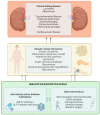Obesity-Related Kidney Disease: Current Understanding and Future Perspectives
- PMID: 37760939
- PMCID: PMC10526045
- DOI: 10.3390/biomedicines11092498
Obesity-Related Kidney Disease: Current Understanding and Future Perspectives
Abstract
Obesity is a serious chronic disease and an independent risk factor for the new onset and progression of chronic kidney disease (CKD). CKD prevalence is expected to increase, at least partly due to the continuous rise in the prevalence of obesity. The concept of obesity-related kidney disease (OKD) has been introduced to describe the still incompletely understood interplay between obesity, CKD, and other cardiometabolic conditions, including risk factors for OKD and cardiovascular disease, such as diabetes and hypertension. Current therapeutics target obesity and CKD individually. Non-pharmacological interventions play a major part, but the efficacy and clinical applicability of lifestyle changes and metabolic surgery remain debatable, because the strategies do not benefit everyone, and it remains questionable whether lifestyle changes can be sustained in the long term. Pharmacological interventions, such as sodium-glucose co-transporter 2 inhibitors and the non-steroidal mineralocorticoid receptor antagonist finerenone, provide kidney protection but have limited or no impact on body weight. Medicines based on glucagon-like peptide-1 (GLP-1) induce clinically relevant weight loss and may also offer kidney benefits. An urgent medical need remains for investigations to better understand the intertwined pathophysiologies in OKD, paving the way for the best possible therapeutic strategies in this increasingly prevalent disease complex.
Keywords: chronic kidney disease; fatty kidney disease; obesity; obesity-related kidney disease; overweight.
Conflict of interest statement
F.F.K., P.A.S., B.J.v.S., and T.I. declares the following conflicts of interest: employees and shareholders of Novo Nordisk A/S. H.J.L.H. declares the following conflicts of interest: Support from a VIDI (917.15.306) grant from the Netherlands Organisation for Scientific Research; consultancy for AstraZeneca, Bayer, Boehringer Ingelheim, Chinook, CSL Behring, Dimerix, Eli Lilly, Gilead, Goldfinch, Janssen, Merck, Mundipharma, Mitsubishi Tanabe, Novo Nordisk, Novartis, and Travere Pharmaceuticals, and has received grant support from AbbVie, AstraZeneca, Boehringer Ingelheim, and Janssen.
Figures

Similar articles
-
Non-steroidal mineralocorticoid antagonists and hyperkalemia monitoring in chronic kidney disease patients associated with type II diabetes: a narrative review.Postgrad Med. 2024 Mar;136(2):111-119. doi: 10.1080/00325481.2024.2316572. Epub 2024 Feb 16. Postgrad Med. 2024. PMID: 38344772 Review.
-
Prevalence of Chronic Kidney Disease in Type 2 Diabetes: The Canadian REgistry of Chronic Kidney Disease in Diabetes Outcomes (CREDO) Study.Clin Ther. 2021 Sep;43(9):1558-1573. doi: 10.1016/j.clinthera.2021.07.015. Epub 2021 Aug 21. Clin Ther. 2021. PMID: 34426012
-
Effectiveness of nonsteroidal mineralocorticoid receptor antagonists in patients with diabetic kidney disease.Postgrad Med. 2023 Apr;135(3):224-233. doi: 10.1080/00325481.2022.2060598. Epub 2022 Apr 20. Postgrad Med. 2023. PMID: 35392754 Review.
-
Evolution of Mineralocorticoid Receptor Antagonists in the Treatment of Chronic Kidney Disease Associated with Type 2 Diabetes Mellitus.Mayo Clin Proc Innov Qual Outcomes. 2022 Oct 15;6(6):536-551. doi: 10.1016/j.mayocpiqo.2022.09.002. eCollection 2022 Dec. Mayo Clin Proc Innov Qual Outcomes. 2022. PMID: 36277502 Free PMC article. Review.
-
Finerenone - are we there yet with a non-steroidal mineralocorticoid receptor antagonist for the treatment of diabetic chronic kidney disease?Expert Opin Pharmacother. 2021 Jul;22(10):1253-1256. doi: 10.1080/14656566.2021.1904892. Epub 2021 Mar 25. Expert Opin Pharmacother. 2021. PMID: 33764251 Clinical Trial.
Cited by
-
Cardiovascular-Kidney-Metabolic Syndrome: A New Paradigm in Clinical Medicine or Going Back to Basics?J Clin Med. 2025 Apr 19;14(8):2833. doi: 10.3390/jcm14082833. J Clin Med. 2025. PMID: 40283662 Free PMC article. Review.
-
Cardiometabolic comorbidities and complications of obesity and chronic kidney disease (CKD).J Clin Transl Endocrinol. 2024 Apr 2;36:100341. doi: 10.1016/j.jcte.2024.100341. eCollection 2024 Jun. J Clin Transl Endocrinol. 2024. PMID: 38616864 Free PMC article. Review.
-
Cinnamaldehyde ameliorates obesity-induced nephropathy in C57BL/6 mice via modulation of AMPK/ACC and NF-kB pathways.Iran J Basic Med Sci. 2025;28(7):60-872. doi: 10.22038/ijbms.2025.83913.18157. Iran J Basic Med Sci. 2025. PMID: 40703753 Free PMC article.
-
The impact of weight loss on renal function in individuals with obesity and type 2 diabetes: a comprehensive review.Front Endocrinol (Lausanne). 2024 Jan 31;15:1320627. doi: 10.3389/fendo.2024.1320627. eCollection 2024. Front Endocrinol (Lausanne). 2024. PMID: 38362272 Free PMC article. Review.
-
Efficacy and Safety of Phase 1 of Very Low Energy Ketogenic Therapy (VLEKT) in Subjects with Obesity and Mild Renal Impairment.Nutrients. 2025 Feb 18;17(4):721. doi: 10.3390/nu17040721. Nutrients. 2025. PMID: 40005050 Free PMC article. Clinical Trial.
References
-
- Lobstein T., Jackson-Leach R., Brinsden H., Gray M. World Obesity Atlas 2023. World Obesity Federation; London, UK: 2023.
Publication types
LinkOut - more resources
Full Text Sources

